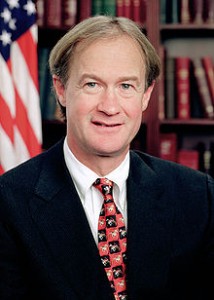2016 Democratic Party Presidential Candidates
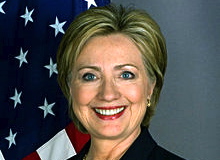
The Daily Show – Democalypse 2016 – Bernie Sanders Kicks Off His Campaign
Vermont Senator Bernie Sanders makes for an unconventional presidential contender, but only in comparison to other candidates.
This article contains lists of candidates associated with the 2016 Democratic Party presidential primaries for the 2016 United States presidential election.
Candidates
Individuals included in this section have taken one or more of the following actions: formally announced their candidacy; filed as a candidate with Federal Election Commission (FEC) (for other than exploratory purposes). They are listed alphabetically by surname.
Candidates featured in major polls
The following candidates have been listed in five or more major independent nationwide polls.
74th Governor of Rhode Island
Lincoln Davenport Chafee (/ˈtʃeɪfiː/; born March 26, 1953) is an American politician from Rhode Island who has served as the Mayor of Warwick (1993–1999), a U.S. Senator (1999–2007) and as the 74th Governor of Rhode Island (2011–2015).
Born in Providence, Chafee is the son of Republican politician John Chafee, who served as the 66th Governor of Rhode Island (1963–1969), the United States Secretary of the Navy (1969–1972) and a U.S. Senator (1976–1999). Lincoln Chafee was educated at Providence Country Day School and Phillips Academy, before graduating with a degree in Classics from Brown University. He then moved to Bozeman, Montana, studying to become a farrier at Montana State University, then working at harness racetracks in the United States and Canada.
2016 Presidential Campaign – Lincoln Chafee presidential campaign, 2016
On April 9, 2015, Chafee announced that he had formed an exploratory committee in preparation for a potential candidacy for President of the United States as a Democrat in 2016. He formally declared his candidacy on June 3, 2015.
 Clinton as Secretary of State in 2009
Clinton as Secretary of State in 2009
Hillary Diane Rodham Clinton (born October 26, 1947) is an American politician in the Democratic Party. She was United States Secretary of State in the administration of President Barack Obama from 2009 to 2013, a United States Senator representing New York from 2001 to 2009, and, as the wife of President Bill Clinton, First Lady of the United States from 1993 to 2001.
A native of Illinois, Hillary Rodham was the first student commencement speaker at Wellesley College in 1969 and earned a J.D. from Yale Law School in 1973. After a stint as a Congressional legal counsel, she moved to Arkansas and married Bill Clinton in 1975. She co-founded Arkansas Advocates for Children and Families in 1977, became the first female chair of the Legal Services Corporation in 1978, and was named the first female partner at Rose Law Firm in 1979. The National Law Journal twice listed her as one of the hundred most influential lawyers in America. During her tenure as First Lady of Arkansas from 1979 to 1981 and 1983 to 1992, she led a task force that reformed Arkansas’s education system and sat on the board of directors of Wal-Mart and several other corporations.
As First Lady of the United States, her major initiative, the Clinton health care plan of 1993, failed to gain approval from the U.S. Congress. In 1997 and 1999, she played a leading role in advocating the creation of the State Children’s Health Insurance Program, the Adoption and Safe Families Act and the Foster Care Independence Act. Her years as First Lady drew a polarized response from the American public. The only First Lady to have been subpoenaed, she testified before a federal grand jury in 1996 regarding the Whitewater controversy, but was never charged with wrongdoing in this or several other investigations during her husband’s presidency. Her marriage to the president was subjected to considerable public discussion following the Lewinsky scandal of 1998.
After moving to New York, Clinton was elected in 2000 as the first female senator from the state; she is the only First Lady ever to have run for public office. Following the September 11 attacks, she supported military action in Afghanistan and the Iraq Resolution, but subsequently objected to the George W. Bush administration’s conduct of the Iraq War. She opposed most of Bush’s domestic policies. Clinton was re-elected to the Senate in 2006. Running in the Democratic primaries in the 2008 presidential election, Clinton’s campaign won far more primaries and delegates than any other female candidate in American history, but narrowly lost the nomination to Obama.
As Secretary of State in the Obama administration from January 2009 to February 2013, Clinton was at the forefront of the U.S. response to the Arab Spring and advocated the U.S. military intervention in Libya. She took responsibility for security lapses related to the 2012 Benghazi attack, which resulted in the deaths of American consulate personnel, but defended her personal actions in regard to the matter. Clinton visited more countries than any other Secretary of State. She viewed “smart power” as the strategy for asserting U.S. leadership and values, by combining military power with diplomacy and American capabilities in economics, technology, and other areas. She encouraged empowerment of women everywhere and used social media to communicate the U.S. message abroad. Leaving office at the end of Obama’s first term, she authored her fifth book and undertook speaking engagements before announcing her second run for the Democratic nomination in the 2016 presidential election.
2016 Presidential Campaign
While Clinton had long indicated that she had no interest in running for president again, she left the State Department with very high approval ratings, and polls have indicated her the overwhelming favorite among Democrats for the 2016 Democratic presidential nomination. By September 2013, amid continual political and media speculation, Clinton said she was considering a run but was in no hurry to decide. Meanwhile, a campaign-in-waiting came into place, including a large donor network, experienced operatives, the Ready for Hillary and Priorities USA Action political action committees, and other infrastructure.
On April 12, 2015, speculation ended as Clinton formally announced her candidacy via email and the release of a video saying, “Everyday Americans need a champion. And I want to be that champion.” She began her campaign by making small-scale trips to early primary and caucus states and engaging in fundraising activities.
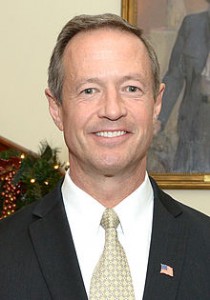 Governor O’Malley in December 2014
Governor O’Malley in December 2014
Martin Joseph O’Malley (born January 18, 1963) is an American politician who served as the 61st Governor of Maryland, from 2007 to 2015. Prior to being elected as Governor, he served as the Mayor of Baltimore from 1999 to 2007, having previously served as a Baltimore City Councilor from 1991 to 1999.
O’Malley served as the Chair of the Democratic Governors Association from 2011 to 2013, while serving as governor of Maryland. Following his departure from public office in early 2015, he was appointed to the Johns Hopkins University’s Carey Business School as a visiting professor focusing on government, business, and urban issues.
As Governor, in 2011, he signed a law that would make certain undocumented immigrants conditionally eligible for in-state college tuition; and in 2012, he signed a law to legalize same-sex marriage in Maryland. Each law was put to a voter referendum in the 2012 general election and upheld by a majority of the voting public.
O’Malley publicly announced his candidacy in the 2016 presidential election on May 30, 2015, in Baltimore, Maryland, and filed his candidacy form seeking the Democratic Party nomination with the Federal Election Commission on May 29, 2015.
2016 Presidential Campaign
O’Malley publicly expressed interest in a presidential run in 2016 on multiple occasions. At a press conference in Milwaukee, Wisconsin, at a National Governors Association meeting in August 2013, O’Malley stated he was laying “the framework” for a presidential run. In April 2015, he said that he expected to make a decision on the race by the end of May 2015.
After months of consideration, O’Malley indicated on Twitter that he would announce his candidacy on May 30, 2015, at Baltimore’s Federal Hill Park.
On May 30, 2015, O’Malley formally announced his candidacy for the 2016 presidential nomination.
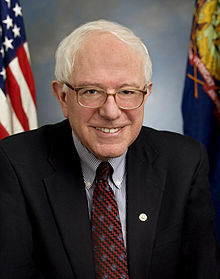 Sanders’s official Senate portrait
Sanders’s official Senate portrait
Bernard “Bernie” Sanders (born September 8, 1941) is an American politician and the junior United States Senator from Vermont.
Sanders is the longest-serving independent in U.S. congressional history. A self-described democratic socialist, he favors policies similar to those of social democratic parties in Europe, particularly those of Scandinavia. He caucuses with the Democratic Party and has been the ranking minority member on the Senate Budget Committee since January 2015.
After unsuccessful candidacies for Vermont’s governor and U.S. senator in the early to mid-1970’s, Sanders was elected mayor of Burlington, Vermont’s most populous city, in 1981. He was reelected to three more two-year mayoral terms before being elected to represent Vermont’s at-large congressional district in the United States House of Representatives in 1990. He served as a congressman for 16 years before being elected to succeed the retiring Republican-turned-independent Jim Jeffords in the U.S. Senate in 2006. In 2012, he was reelected by a large margin, capturing almost 71% of the popular vote.
Since his election to the Senate, Sanders has emerged as a leading progressive voice on issues like income inequality, climate change, and campaign finance reform. He rose to national prominence on the heels of his 2010 filibuster of the proposed extension of the Bush-era tax rates for the wealthy. Sanders is also outspoken on civil liberties issues, and has been particularly critical of mass surveillance policies such as the Patriot Act.
Sanders announced his intentions to seek the Democratic Party’s nomination for President on April 30, 2015, in an address on the Capitol lawn. His campaign was officially launched on May 26 in Burlington.
2016 Presidential Campaign – Sanders campaigning in Minnesota
In an interview with The Nation on March 6, 2014, Sanders stated that he was “prepared to run for President of the United States” in 2016 but did not officially announce a campaign. On April 28, 2015, Vermont Public Radio reported that Sanders would announce his candidacy for the Democratic presidential nomination on April 30. The official announcement came on May 26 in Burlington, Vermont.
On April 30, Sanders announced he was running for president in an address on the Capitol lawn, saying, “I don’t believe that the men and women who defended American democracy fought to create a situation where billionaires own the political process.” His entry into the race was welcomed by Senator Elizabeth Warren, saying “I’m glad to see him get out there and give his version of what leadership in this country should be.” Warren has resisted calls to become a candidate herself.
Unlike the other presidential candidates, Sanders stated he will not pursue funding through a Super PAC, instead focusing on small individual donations. Sanders’s presidential campaign raised $1.5 million within 24 hours of his official announcement. After four days, Sanders’s campaign had raised $3 million from small donors, with an average of $43 per donation. On July 2, the campaign announced it had raised $15 million from 250,000 donors. (By contrast, Barack Obama attracted only 180,000 donors during the first quarter of his presidential campaign in 2007.
Sanders in 2015 speaking at an event in Arizona
Sanders has used social media to help his campaign gain momentum. Along with posting content on Twitter and Facebook, he held an “Ask Me Anything” on Reddit on May 19, where his answers garnered thousands of “upvotes”. Sanders has also gained a large grassroots organizational following online. A July 29 meetup organized online brought 100,000 supporters to more than 3,500 simultaneous events nationwide.
On June 25, 2015, The New York Times noted that Sanders was “running right alongside Clinton in a statistical dead heat for the 2016 Democratic presidential nomination in the New Hampshire primaries”, citing a CNN/WMUR poll. The Guardian pointed out that when Clinton and Sanders made public appearances within days of each other in Des Moines, Iowa, it was Sanders who drew larger crowds, although he had already made numerous stops around the state, while it was Clinton’s first visit of the year.
Sanders’s campaign events in June 2015 drew “overflow crowds” around the country, to his surprise. On July 1, 2015, Sanders’s campaign stop in Madison, Wisconsin, drew the largest crowd of any 2016 presidential candidate to that date, with an estimated turnout of 10,000. On July 18, he drew an even larger crowd in Arizona, with an estimated turnout of over 11,000.
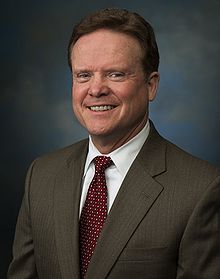 United States Senator from Virginia
United States Senator from Virginia
James Henry “Jim” Webb, Jr. (born February 9, 1946) is an American politician and author. He has served as a United States Senator from Virginia, Secretary of the Navy, Assistant Secretary of Defense, Counsel for the House Veterans Affairs Committee, and Marine Corps officer. In the private sector he has been an Emmy-award winning journalist, a filmmaker, and the author of ten books. In addition, he taught literature at the United States Naval Academy and was a Fellow at the Harvard Institute of Politics. As a member of the Democratic Party, Webb announced on November 19, 2014, that he was forming an exploratory committee to evaluate a run for President of the United States in 2016. On July 2, 2015, he announced that he would be joining the race for the Democratic nomination for President.
2016 Presidential Campaign
On November 19, 2014, Webb announced the formation of an exploratory committee in preparation for a possible bid for the Democratic Party’s nomination for President of the United States in 2016. He made the announcement via a video posted on his website, as well as on YouTube.
On June 15, 2015, Webb announced he would make a decision regarding a presidential bid by the end of the month.
Webb made a formal announcement on July 2, 2015, that he will seek the Democratic Party’s nomination for the presidency through an open letter on his webb2016 website.
https://en.wikipedia.org/wiki/Democratic_Party_presidential_candidates,_2016

